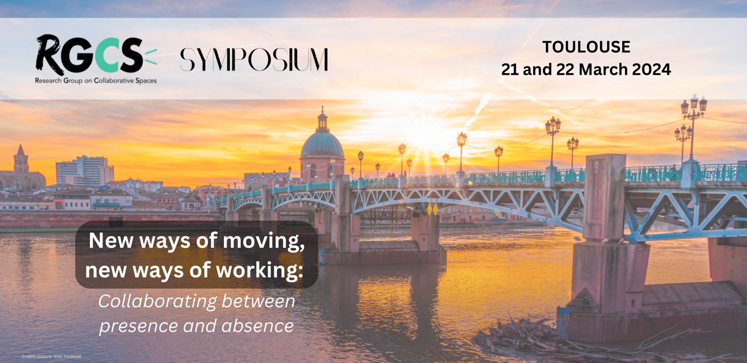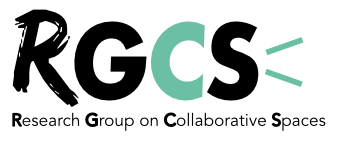 Does mobility matter to new ways of working or is mobility a matter of new ways of working?
Does mobility matter to new ways of working or is mobility a matter of new ways of working?
Mobility matters for new ways of working because being face-to-face may not always be necessary, efficient, ecological, or even desirable. Hybrid and remote work involves commuting between more and more distanced places: digital nomadism even transforms movement into a way of life (Aroles et al., 2023; Aroles et al., 2020). On the other hand, mobility is a crucial matter for discussions around new ways of working because the possibilities of working from anywhere gather considerations for individuals, organizations and societies regarding carbon footprint, cultural transformation, and how we work together.
Technology has become a key mediator between collaborators far and near (Hafermalz & Riemer, 2020). Information technology enables near costless communication across time zones or office walls and transportation technologies enable better and faster mobility. Today, machines offer feedback and support creativity, they write and respond, edit and correct the human expression for better and worse. Communication technologies bridge distance between collaborators and mediate anything from gestures to language differences. Has mobility peaked and do we no longer need to share the same location to collaborate effectively? Or is travel growing because work is perceived as frustrating without the human touch?
Today, people work while moving much more than they move to go to work. Even their digital tools involve free work, data production and continuous possibility to work (making work a strange and alienating us from work) (Marx, 1844; Byron, 2016; Petriglieri et al., 2019). Organizations and their management try to shift the modalities of their expression as well as the location of their decision making and impact. In contrast to past, emplaced, grounded Taylorian spaces of management, management is becoming an open, mobile, public exercise likely to be done from anywhere, and to apply to things and people located themselves anywhere and while moving (Cnossen et al., 2020).
Climate change leads us to question consumption in leisure and mobility in general, inviting the airline and rail industries to radically renew their approach to customers. Ethical and moral considerations enter not only consumption but work in general with renewed interest in the topic of virtues and social practice as well as moral decision making (Grattarola et al., 2023). Questions of boundaries in space and in boundary work reveal fluidity, invisibility, and permeability and involve key concepts in organizational behavior (Azambuja et al., 2022).
Pressing practical questions need to be addressed in practice: how will office space change? How is hybrid working organized and what are productivity consequences (see Tagliaro and Migliore, 2022)? Many of the key challenges revolving around collaboration and mobility cross disciplinary boundaries and can be anchored in space (deVaujany and Vaast, 2014) and research ranging from organization theory to strategy and innovation studies aims to make sense of new forms of organizing collaboration (Lô and Fatien Diochon, 2020; Zakoth et al., 2023).
The phenomenon of mobility and the use of space gain relevance across the disciplines of management, architecture, sociology, urban planning and more and the following questions are neither exhaustive nor complete in any way. Consider them a source of inspiration for your submissions and send us your work if you wish to present it in Toulouse in March!
-
How is movement at work renewed by new ways of working in our post-pandemics world?
-
What is the relationship between physical presence and virtual presence including the role of the metaverse and virtual worlds?
-
What are the new modes of embodiment at stake with contemporary ways of working and managing?
-
How can traditional notions of spaces and places be revisited to make sense of our new open, fluid, continuous world of work?
-
How are the temporalities of work renewed by our ways of working that include work while moving and public domains?
-
How are the new movements and mobilities datafied, captured, and analyzed?
-
What is the role of AI in the new images and representations of mobility and movement in new ways of working?
-
How can modes of transportations be renewed or re-interpreted?
-
How does the spatial design of workspaces influence mobility patterns?
-
What is considered too far to reach and what is too close for comfort? How is presence perceived emotionally and physically?
-
Mobility and virtuality - navigating space(s) and time(s) through digital technologies more generally: what are key affordances of virtual presence?
-
What are the architectural features of the metaverse relevant for work practices today?
-
What is the link between trust and collaboration when machines become imposters and deep fakes manage to trick us into believing things as we appear to have seen them with our own eyes?
-
Social and spontaneous contexts often appear most elusive in distant interactions: what are the cues and opportunities for interaction in space, embodied or mediated?
-
Certain contexts, such as Free and Open Source software development, appear to demonstrate that innovation emerges from (exclusively) distant interactions over many years. What are the boundary conditions for creativity and innovation in terms of embodiment and movement?
-
What are the strategic implications of hybrid work for companies?
-
Digital innovation processes benefit from swift and constant interactions that leave interpretations fluid and design ongoing: how does mobility impact digital innovation processes?
Keywords: moving, working, timing, collaborating, presence, absence, mobile work, hybrid work, remote work, metaverse, travel, transportation, information systems, embodiment, decision making, ethics, moral dilemma, ethical consumption, digital innovation
Submissions will be considered for a special issue to be published at the Journal of Openness, Commons & Organizing (JOCO). You are invited to submit extended abstracts (around 3 pages/ 1000 words), via https://symposiumrgcs.sciencesconf.org/ by 31 January 2024. You can expect the notification regarding your submission by mid to end of February 2024. If you have questions or comments, please contact us at: collaborativespaces@gmail.com.
We are an international association, and inclusivity is one of the pillars of the RGCS community. In that sense, although we cannot host the full event online/hybrid, specific activities will be broadcast, and some sessions will be set in online mode. Thus, if this CfP speaks to you, submit your abstract and/or register for the symposium.
When registering for the event, please indicate whether you plan to attend onsite [Toulouse] or online [platform to be announced].
References
Aroles, J., Bonneau, C., & Bhankaraully, S. (2023). Conceptualising ‘meta-work’ in the context of continuous, global mobility: The case of digital nomadism. Work, Employment and Society, 37(5), 1261-1278.
Aroles, J., Granter, E., & de Vaujany, F. X. (2020). ‘Becoming mainstream’: the professionalisation and corporatisation of digital nomadism. New Technology, Work and Employment, 35(1), 114-129.
Azambuja, R., Islam, G., & Ancelin‐Bourguignon, A. (2022). Walling in and walling out: middle managers' boundary work. Journal of Management Studies.
Byron, C. (2016). Essence and Alienation: Marx's Theory of Human Nature. Science & Society, 80(3), 375-394.
Cnossen, B., de Vaujany, F. X., & Haefliger, S. (2021). The street and organization studies. Organization Studies, 42(8), 1337-1349.
De Vaujany, F. X., & Vaast, E. (2014). If these walls could talk: The mutual construction of organizational space and legitimacy. Organization Science, 25(3), 713-731.
Grattarola, A., Gond, J. P., & Haefliger, S. (2023). Traduttore, Traditore? Gains and Losses From the Translation of the Economies of Worth. International Journal of Management Reviews.
Hafermalz, E., & Riemer, K. (2020). Interpersonal connectivity work: Being there with and for geographically distant others. Organization Studies, 41(12), 1627-1648.
Lô, A., & Fatien Diochon, P. (2020). Rethinking contextual ambidexterity through parallel structures. R&D Management, 50(4), 522-534.
Marx, K. (1844) (2005). Early writings. Penguin UK.
Petriglieri, G., Ashford, S. J., & Wrzesniewski, A. (2019). Agony and ecstasy in the gig economy: Cultivating holding environments for precarious and personalized work identities. Administrative Science Quarterly, 64(1), 124-170.
Tagliaro, C., & Migliore, A. (2022). “Covid-working”: what to keep and what to leave? Evidence from an Italian company. Journal of Corporate Real Estate, 24(2), 76-92.
Zakoth, D., Mauroner, O., & Emes, J. (2023). The role of makerspaces in innovation processes: an exploratory study. R&D Management.
